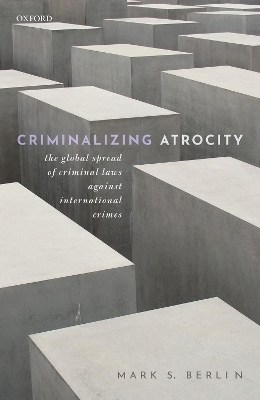
Criminalizing Atrocity
The Global Spread of Criminal Laws against International Crimes
Seiten
2020
Oxford University Press (Verlag)
978-0-19-885044-1 (ISBN)
Oxford University Press (Verlag)
978-0-19-885044-1 (ISBN)
The first book to systematically examine why countries adopt laws criminalizing genocide, war crimes, and crimes against humanity.
Why do countries adopt criminal legislation making it possible to prosecute government and military officials for human rights violations? Over the past thirty years, dozens of countries have prosecuted their own or other states' officials for past atrocities. In Criminalizing Atrocity, Mark Berlin tells the story of the global spread of national criminal laws against atrocity crimes - genocide, war crimes, and crimes against humanity - laws that have helped pave the way for this remarkable trend toward greater accountability. He traces the early 20th-century origins of national atrocity laws to a group of influential European criminal law scholars and explains the global patterns by which these laws have since spread.
Berlin shows that understanding why countries criminalize atrocities requires understanding how they do so. In many cases, criminalization has not been the result of concerted government initiative, but of inconspicuous choices made by technocratic legal experts who have been delegated authority to draft large-scale reforms to countries' national criminal codes. Drawing on research in comparative law and norm diffusion, Berlin explains how such reform projects prompt technocratic drafters to select legal ideas, like atrocity laws, that have been endorsed by their professional communities and deemed by drafters to be important features of a ''modern'' criminal code. To test this argument, Berlin draws on original quantitative and qualitative data, including in-depth case studies of Guatemala, Poland, Colombia, and the Maldives, and a new, comprehensive dataset tracking the global spread of atrocity laws since Word War II. The book's findings highlight the importance of professional communities in the modern renaissance of atrocity justice and the domestication of international legal norms.
Why do countries adopt criminal legislation making it possible to prosecute government and military officials for human rights violations? Over the past thirty years, dozens of countries have prosecuted their own or other states' officials for past atrocities. In Criminalizing Atrocity, Mark Berlin tells the story of the global spread of national criminal laws against atrocity crimes - genocide, war crimes, and crimes against humanity - laws that have helped pave the way for this remarkable trend toward greater accountability. He traces the early 20th-century origins of national atrocity laws to a group of influential European criminal law scholars and explains the global patterns by which these laws have since spread.
Berlin shows that understanding why countries criminalize atrocities requires understanding how they do so. In many cases, criminalization has not been the result of concerted government initiative, but of inconspicuous choices made by technocratic legal experts who have been delegated authority to draft large-scale reforms to countries' national criminal codes. Drawing on research in comparative law and norm diffusion, Berlin explains how such reform projects prompt technocratic drafters to select legal ideas, like atrocity laws, that have been endorsed by their professional communities and deemed by drafters to be important features of a ''modern'' criminal code. To test this argument, Berlin draws on original quantitative and qualitative data, including in-depth case studies of Guatemala, Poland, Colombia, and the Maldives, and a new, comprehensive dataset tracking the global spread of atrocity laws since Word War II. The book's findings highlight the importance of professional communities in the modern renaissance of atrocity justice and the domestication of international legal norms.
Mark S. Berlin is an assistant professor of Political Science at Marquette University. His research examines how international law shapes countries' domestic laws and institutions, with a focus on human rights and criminal law. His research has been supported by the U.S. National Science Foundation, and he is a former guest researcher at the Peace Research Institute Frankfurt (PRIF).
1: The puzzle of atrocity criminalization
2: Explaining the criminalization of atrocities
3: Domesticating atrocity law: A brief global history
4: Pathways and determinants of atrocity criminalization
5: The criminalization of atrocities in Guatemala
6: When criminal code reform does not lead to atrocity criminalization
7: Conclusion
| Erscheinungsdatum | 27.05.2020 |
|---|---|
| Verlagsort | Oxford |
| Sprache | englisch |
| Maße | 160 x 240 mm |
| Gewicht | 540 g |
| Themenwelt | Sozialwissenschaften ► Politik / Verwaltung ► Europäische / Internationale Politik |
| Sozialwissenschaften ► Politik / Verwaltung ► Politische Theorie | |
| ISBN-10 | 0-19-885044-1 / 0198850441 |
| ISBN-13 | 978-0-19-885044-1 / 9780198850441 |
| Zustand | Neuware |
| Haben Sie eine Frage zum Produkt? |
Mehr entdecken
aus dem Bereich
aus dem Bereich
Studienbuch
Buch | Hardcover (2023)
De Gruyter Oldenbourg (Verlag)
44,95 €
erfolgreiche Interessenvertretung durch Prozesskompetenz im komplexen …
Buch | Hardcover (2023)
Wiley-VCH (Verlag)
42,00 €


